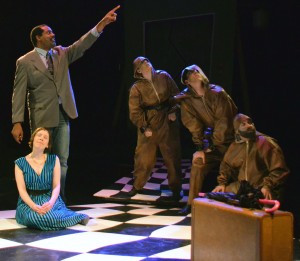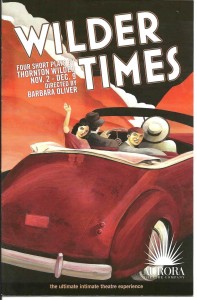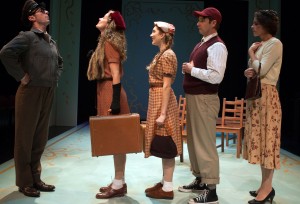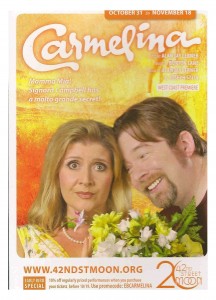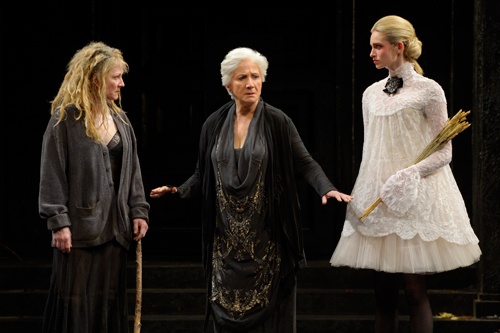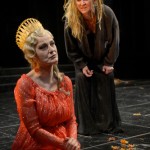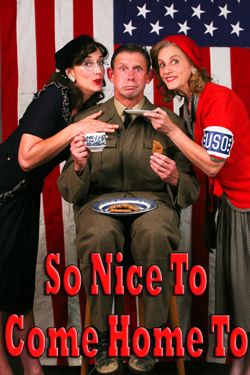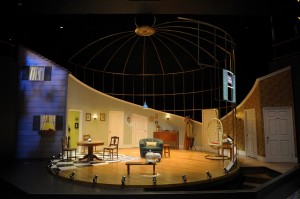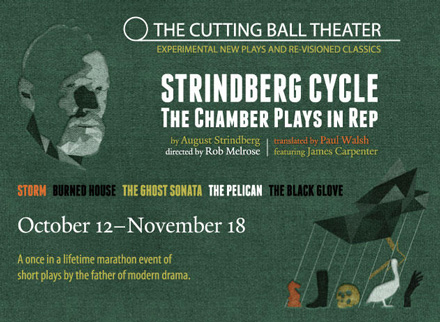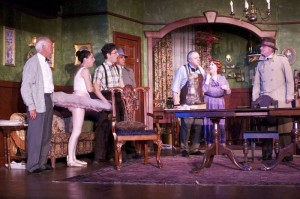
(l to r) Wood Lockhart, LeAnne Rumbel, Isaac Islas, G- man, Richard Kerrigan, Maureen O’Donoghe, G-man in You Can’t Take it With You at RVP)
YOU CAN’T TAKE IT WITH YOU: Comedy by Moss Hart and George S. Kaufman. Directed by Jim Dunn. Ross Valley Players (RVP) Barn Theater, Marin Art & Garden Center, 30 Sir Francis Drake Blvd., Ross. 415-456-9555, ext. 1 or www.rossvalleyplayers.com. November 16 – December 2, 2012
YOU CAN’T TAKE IT WITH YOU hits a home run at Ross Valley Players
Since our San Francisco Giants won the World Series it seems appropriate to use a couple of baseball analogies to describe the home run hit of You Can’t Take It With You ‘trotting’ the boards at RVP. ‘Trotting’ is a misnomer since the evening races by in little over two hours with two intermissions. Yes, director Jim Dunn keeps the three act format intact. He also reduces the number of characters from 17 to 14 with some doing double duty. A major change is casting Reba (delightful Kim Bromley), the cook and Donald (Javier Alarcon) her paramour as white. I guess it is a concession to political correctness since they are described in the original play as “The two of them are really cute together, something like Porgy and Bess.” The other noticeable change is the deleting of the drunken actress from Act two. The big hitters, and excellent supporting cast, make these changes somewhat superfluous.
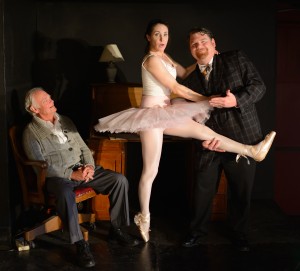
Keith Lockhart, LeAnne Rumbel and John Starr (See Text)
The first big hitter is director James Dunn who dedicates the play to his step-grandmother who instilled the love of movies, and particularly the movie You Can’t Take it With You, during Big Depression of the 1930s. The other big hitters (I dare not call them old-timers?) are Wood Lockhart (Grandpa Martin Vanderhof), Bob Wilson (Mr. DePinna), Stephen Dietz (Mr. Kirby), Maureen O’Donoghue (Penny Sycamore) and set designer Ken Roland. The supporting cast holds their own amongst these luminaries.
The play was written in 1931 and the scene of the action is the Vanderhof home in New York City in the midst of the Depression. Kaufman was an established writer but Moss Hart was brought along for his ability to write comedic dialog. It was a highly successful pairing since the play had a long Broadway run winning the Pulitzer Prize. It became a hit movie with Lionel Barrymore, Jimmy Stewart and Jean Arthur in the lead roles winning two Academy Awards from seven nominations: Best Picture and Best Director for Frank Capra.
Written about eccentric characters, it would be easy for the director to turn the actors loose allowing them to exaggerate their roles. With the exception of John Starr appropriately playing the mad Russian ballet instructor with broad strokes, the actors are kept in tight ensemble form by director Dunn with each complimenting the others. You will find two or three who are more appealing and this reviewer’s favorites are the four big hitters and a perfect Robyn Grahn as Alice Sycamore, the only non-eccentric member of Grandpa Vanderhof’s home
There are three related generations living in the house who have taken on the patriarch’s philosophy of living an enjoyable life because, as he mentions in the final scene to the uptight Wall Street maven Mr. Kirby “you can’t take it with you.” Before we get to that dénouement many things must happen and they do.
Consider that Granpa is a dropout for 35 years from the business rat race and has not, for (in his mind) good reasons not paid income taxes and has received many unopened letters about this oversight. You know and I know that the IRS isn’t going to put up with that and along comes Henderson the income tax man (Frederick Lein) with a warning that is unheeded. Penny, Grandpas daughter is married to child-like Paul Sycamore who manufactures fireworks in the basement and loves to make toys. Paul is helped by Mr. DePinna, an ice man who came inside to speak to Paul eight years before, and never left. He also moonlights as a model in Mrs. Sycamore’s paintings, especially on called “The Discus Player.”
Then there is Essie wife of Ed, daughter of Penny and Paul Sycamore and sister to Alice. Essie makes candies in the kitchen and Ed sells them, inserting his beloved printed notes in the boxes. Essie who has practicing ballet for eight years is accompanied on the xylophone by Ed. Alice is in love with her boss Tony Kirby and they get engaged. It just happens that Tony’s parents are uptight rich nabobs.
All hell breaks loose when the Kirby’s arrive on the wrong day to have dinner. This includes a word association game that is hilarious. Robyn Wiley as elegant Mrs. Kirby exudes haughtiness. Kolenkhove offers Mr. Kirby a wrestling lesson that goes awry. Then there is exploding fireworks, FBI agents, who have been following Ed for his innocuous but subversive printing. They are all hustled off to jail. End of Act two but all gets resolved in act three.
Lockhart was born to play the lead and as he underplays the role to perfection, scene stealer Bob Wilson shows his ability and . . . (horrors) a bit of his red tartan plaid shorts in his brief stint to model as the discus player. Handsome Isaac Islas begins hesitantly but picks up the pace in his later scenes. Ross Berger as Ed expertly dovetails his secondary role into the evening’s proceedings. LeAnne Rumbel playing Essie is marvelous in her ineptitude as a budding Ballerina.
Once again, Ken Rowland has created a set with furniture, props and décor that reflects the 1930s . Michael A. Berg’s authentic costume designs add to ambiance.
Kedar K. Adour, MD
Courtesy of www.theatreworldintermagazine.com


